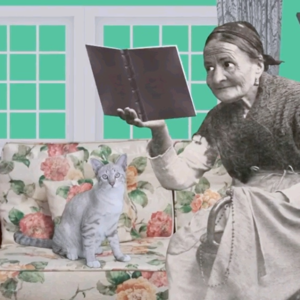Why time seems to fly as you get older? | BBC Ideas
When I was a child, I was about eight years old, and I went to climb on a house that was under construction in our neighbourhood. So I stepped up to the edge and I fell, and the fall seemed to take a very long time, so then I was looking down at the ground watching the red brick floor come towards me and once I hit the ground then I went unconscious but it got me interested in the question of - how we perceive time.
在我小时候,大约八岁时,我去爬我们邻居正在建造的房子。于是我走到了边缘,然后摔了下来,摔落的过程似乎持续了很长时间,我看着下方的地面,看着红砖地面向我逼近。我一落地就失去了知觉,但这让我对我们“如何感知时间”这个问题产生了兴趣。
When I grew up and I became a neuroscientist, what I realised was we all come into the world with this idea that time is just a river that's flowing forward in one direction at a fixed speed, but what we know is that it can be different in your head and in my head, because it's somehow a psychological construct, time. In other words, your brain is locked in silence and darkness inside the vault of your skull and its job is to figure out what's happening outside but it has to do a lot of editing tricks.
当我长大后成为一名神经科学家时,我意识到我们来到这个世界时都有这样一个想法:时间只是一条以固定速度朝一个方向流淌的河流,但我们知道的是,它在你的脑袋里和在我的脑袋里可能是不一样的,因为时间在某种程度上是一种心理建构。换言之,你的大脑被困在头骨内的寂静与黑暗之中,它的任务是解读外界的情况,但为此它不得不施展许多编辑技巧。
Your vision and your hearing process signals at different speeds and yet, when you see somethinhg like a balloon pop or somebody clapping their hands, it appears as though the sight and sound are synchronised. And what that means is the brain has to be collecting all the information before it puts together a final story and serves that up to your conscious perception. It's like there's a buffer where it looks for other signals coming up the pipeline and as a result it means that we're all living a little bit in the past. What we think is happening right now has actually already transpired some time ago, probably in the ballpark of about half a second ago.
你的视觉和听觉处理信号的速度不同,然而,当你看到气球爆炸或有人拍手时,似乎视觉和听觉是同步的。这意味着,大脑必须先收集所有信息,然后才能整合出一个最终的故事,并将其呈现给你的意识感知。就像有一个缓冲区,在寻找即将到达信息通道的其他信号,这意味着我们都有点活在过去。我们认为正在发生的事情实际上已经发生在大约半秒钟前。
In the lab if I show you a photograph for half a second on the screen and then I show you that same photograph again for half a second and then again and again and again. And now I show you a different photograph for the same amount of time, it will seem as though the new photograph, the oddball, stays on the screen for a much longer time. Essentially when the brain sees something that's novel, it has to burn more energy to represent it because it wasn't expecting that. This feeling that things are going in slow motion is a trick of memory.
在实验室里,如果我让你在屏幕上看一张照片半秒钟,然后再让你看同一张照片半秒钟,然后一遍又一遍。现在我再给你看一张不同的照片,时间相同,似乎新照片,也就是怪照片,在屏幕上停留的时间会更长。本质上,当大脑看到新奇的事物时,它需要消耗更多的能量来表征它,因为它没有预料到这一点。感觉时间变慢是一种记忆的错觉。
In other words, when you're in an emergency situation a part of the brain called the amygdala comes online, this is your emergency control centre, it lays down memories on what amounts to a secondary memory track, these are very dense memories. And you're noticing everything around you and writing it all down. So when the brain reads that back out, there's such a density of memory there, that the brain's only conclusion is that must have taken a long time. And I think this offers an explanation for why people think that time seems to speed up as they grow older.
换句话说,当你处于紧急情况时,大脑中被称为杏仁核的部分就会启动,这是你的紧急控制中心,它将记忆储存在相当于二级记忆轨道的地方,这些记忆非常密集。你会注意你周围的一切,并把它们都记录下来。所以当大脑读取这些信息时,那里的记忆密度很高,大脑得出的唯一结论就是这肯定花了很长时间。我认为这可以解释为什么人们认为随着年龄的增长,时间似乎在加速。
And it's because when you're a child, everything's new to you. You're figuring out the rules of the world, you're writing down a lot of memory, and so when you look back at the end of a year, you have a lot of memory of what you've learnt. But when you're much older and you look back at the end of the year, you're probably doing approximately the same stuff you've been doing for the X number of previous years. And so it seems like the year just went by in a flash.
这是因为当你还是个孩子时,一切对你来说都是新的。你在摸索这个世界的规则,你记下很多记忆,所以当你在一年结束时回头看,你对你所学到的东西有很多记忆。但是,当你长大很多,在年末回首往事时,你可能会做着和前几年差不多的事情。所以这一年似乎只是在一瞬间就过去了。
Really the way to feel as though you've lived longer is to seek novelty. So you can start with something simple like putting your wristwatch on your other hand or brushing your teeth with your other hand. Something this simple just forces the brain into a new mode where it can't predict exactly what's going to happen but instead has to be engaged. And what that means is when you go to bed at night time you have a lot of footage to draw upon and it feels like your life is lasting longer.
想要感觉自己活得更长,最好的办法就是寻找新鲜事物。所以你可以从一些简单的事情开始,比如把手表戴在另一只手上,或者用另一只手刷牙。这么简单的事情只会迫使大脑进入一种新的模式,在这种模式下,它不能准确地预测将要发生什么,而是必须参与其中。这意味着当你晚上上床睡觉的时候,你有很多画面可以回味,感觉你的生命更长了。
★原视频以及更多英语听力见公众号[琐简英语]


BBC Ideas|为什么年龄越大,时间过得越快?
4分钟 · 1147·
1147· 1
1
 1147
1147 1
1
琐简英语
2024.8.29
0
声明一下:虽然这篇是BBC Ideas内容,但不是英音,声音是David Eagleman,是美国神经学家

